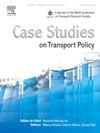Technological transformations and the future of public transport labor: Imaginaries of transport administrators and workers in Luxembourg
IF 3.3
Q3 TRANSPORTATION
引用次数: 0
Abstract
Historically, technological change has always been a feature of public transport labor, changing the nature of work in the sector and creating new jobs while making others obsolete. Now, however, rapid developments in digitalization, automation, and electric mobility are accelerating the pace of change, raising questions about the future of work in this industry. While some of the changes are positive, potentially making transport labor safer, others pose concrete threats to transport jobs. From ticket machines to autonomous vehicles to trains that can perform many of the safety functions previously performed by onboard personnel, public transport work around the world risks being outsourced from humans to machines.
In Luxembourg, where all public transport (including trains, buses, and trams) has been free at the point of use since 2020, transport administrators frequently express optimism about technological developments in the sector whereas those who work inside transport vehicles often express uncertainty about the future of their work. This paper explores how technological changes alter workers’ everyday experiences and impact how they imagine the future of their work. It engages with a rich body of anthropological literature around labor automation, work futures, and time, placing these into dialogue with ethnographic research with railway workers and public transport administrators in Luxembourg.
技术变革和公共交通劳动力的未来:卢森堡交通管理者和工人的想象
从历史上看,技术变革一直是公共交通劳动力的一个特征,它改变了该部门的工作性质,创造了新的工作岗位,同时使其他工作岗位过时。然而,现在数字化、自动化和电动交通的快速发展正在加速变革的步伐,这引发了对该行业未来工作的质疑。虽然其中一些变化是积极的,可能会使运输劳动更安全,但其他变化对运输工作构成了切实的威胁。从自动售票机到自动驾驶汽车,再到可以执行许多以前由车上人员执行的安全功能的火车,世界各地的公共交通工作都有可能从人类外包给机器。在卢森堡,自2020年以来,所有公共交通工具(包括火车、公共汽车和有轨电车)在使用点都是免费的,交通管理人员经常对该部门的技术发展表示乐观,而在运输车辆内工作的人往往对他们工作的未来表示不确定。本文探讨了技术变革如何改变工人的日常体验,并影响他们对未来工作的想象。它结合了大量关于劳动自动化、工作未来和时间的人类学文献,将这些文献与卢森堡铁路工人和公共交通管理人员的民族志研究进行了对话。
本文章由计算机程序翻译,如有差异,请以英文原文为准。
求助全文
约1分钟内获得全文
求助全文

 求助内容:
求助内容: 应助结果提醒方式:
应助结果提醒方式:


